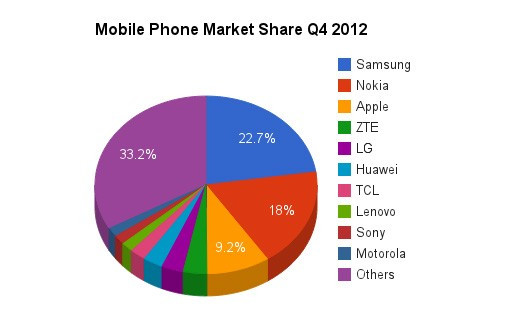Mobile Phone Sales Decline Despite Smartphone Boom
Sales of feature phones dropped almost 20% in the final three months of 2012 and despite a huge increase in the number of smartphones sold, the overall phone market declined 1.7 percent.

The decline is the first since 2009 and, according to research company Gartner who published the figures, this was down to "tough economic conditions, shifting consumer preferences and intense market competition."
Feature phone sales totalled 264.4 million in the last quarter of 2012, down 19.3 percent compared to the same period last year. However smartphone sales in contrast were up 38.3 percent in the final quarter with 207.7 million devices sold in the three months to the end of December.
Gartner says it expects feature phone sale to continue to decline while smartphone sales will continue their strong growth, with the research company predicting that over one billion smartphones will be sold in the current year.
The two companies making the most out of the smartphone boom continue to be Samsung and Apple as they cemented their position at the top of the smartphone rankings. The two technology giants now control 52 percent of the market between them - up from 46.4 percent in the previous quarter.

Samsung is the clear leader in the Android eco-system, commanding 42.5 percent of the market globally, while the next biggest Android manufacturer has a six percent share. "The Android brand is being overshadowed by Samsung's brand with the Galaxy name nearly a synonym for Android phones in consumers' mind share," said Anshul Gupta, principal research analyst at Gartner
Huawei gain
Chinese company Huawei is also making great strides in the smartphone market and recorded growth of 73 percent year-on-year to take third spot in the smartphone market in the final quarter of 2012. In total in 2012 Huawei sold 27.2 million smartphones and the company is targeting markets outside its native China in 2013 with devices like the Ascend D2 and Mate smartphones aiming to challenge at the high-end of the market.
However Huawei's place as the world's third biggest mobile phone manufacturer is not certian to continue, according to Gartner.
"There is no manufacturer that can firmly lay claim to the No. 3 spot in global smartphone sales," said Gupta. "The success of Apple and Samsung is based on the strength of their brands as much as their actual products. Their direct competitors, including those with comparable products, struggle to achieve the same brand appreciation among consumers, who, in a tough economic environment, go for cheaper products over brand."
Nokia on the other hand continues to suffer. Its market share of 18 percent is an all-time low for the Finnish company which once dominated the market. It has seen its share of the mobile phone market drop a further five percent in the last 12 months, despite positive response to its budget Asha range of phones and the launch of a new line of Windows Phone 8 handsets.

Turning to operating systems, in the past year Android has grown strongly and now dominates the smartphone landscape with 69.7 percent market share - up from 51.3 percent this time last year. Apple's iOS in comparison has lost ground, dropping from 23.6 percent to 20.9 percent over the past 12 months.
The biggest fall however has been in sales of Symbian-based phones from Nokia, which held 11.6 percent of the market at the end of 2011 but only accounted for 1.2 percent of smartphones sold in the final three months of 2012.
BlackBerry
BlackBerry was another loser over the past 12 months, with its market share dipping from 8.8 percent to just 3.5 percent. The company last month launched its new BlackBerry 10 platform, which is seen as a make-or-break moment for the Canadian company.
It is likely to go head-to-head with Windows Phone for third place in the smartphone market. And while the market share of Windows Phone is still just three percent, it is moving in the right direction, up from 1.8 percent at the end of 2011.
"2013 will be the year of the rise of the third ecosystem as the battle between the new BlackBerry10 and Widows Phone intensifies," said Gupta.
"As carriers and vendors feel the pressure of the strong Android's growth, alternative operating systems such as Tizen, Firefox, Ubuntu and Jolla will try and carve out an opportunity by positioning themselves as profitable alternatives."
© Copyright IBTimes 2025. All rights reserved.






















